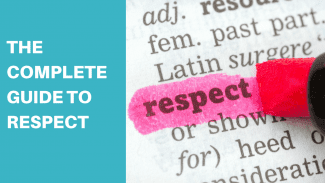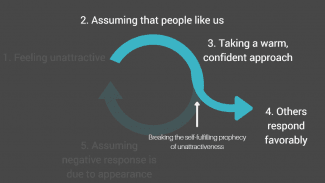As soon as some people enter a room, everyone turns their heads. It can be hard to see exactly how they get everyone’s immediate respect and attention. These people likely show off a high-status behavior.
In this guide, you will learn the principles anyone can use to improve their status and social value.
In chapter 1, we talk about how to appear more high value and high status.
In chapter 2, we talk about how to feel more high value and high status.
How to increase your social status and value
1. Use smooth body movements
Avoid jerky movements when you move your arms, head, or walk around. When we feel nervous, we tend to move around with jerky motions. (Looking around the room by turning the face jerkingly, walking fast, moving arms in a twitching way, etc).
Jerky movements are often associated with prey animals (squirrels, mice) and fluid movements are associated with predators (lions, wolves).[1]
2. Maintain eye contact
Eye contact is a strong indicator of social status.[2]
- To increase your social value, keep eye contact whenever you greet people or make conversation.
- When you greet people, try maintaining eye contact one extra second after you’ve shaken hands. It signals confidence and helps you connect.[3]
- If you feel uncomfortable keeping eye contact, think of it as your mission to learn the eye color of people’s irises.
Here’s a guide on how to make confident eye contact.
3. Use a confident, calm voice
Practice using a confident, calm voice when you’re by yourself. You don’t necessarily need to speak loudly, just loud enough to always make yourself heard. An unnecessarily loud or yelling voice can be a sign of insecurity.
Speak calmly as in not anxiously. (Not calm as in the cheesy seducer in the movies.)
4. Take responsibility for the group
Make sure that everyone in the group feels heard and are taken care of. Here are some examples of how you can include others in a conversation:
- “Let’s wait for Shadia so she can keep up with us.”
- “Robin, what are your thoughts on..”
- “I like what Andrew said about…”
5. Speak less and summarize others when you do
High-status people often speak a little less than others, and in a group, they speak at the end of discussions rather than at the beginning of discussions. They summarize what others said:
“Liza had a good point regarding unemployment, and we also have to keep in mind what John said about job automation. I’d say…”
6. Avoid explaining yourself because of insecurity
Let’s say that your laundry machine broke and you’ve have worn the same t-shirt for a few days. It might be tempting to try to explain the situation. However, that might signal insecurity about what others think. There’s nothing wrong with explaining yourself – just don’t do it out of insecurity or wish for approval.
Don’t explain yourself if you get criticized. That often just comes off as excuses. Instead, acknowledge the critique and focus on how you can improve.[4]
7. Be comfortable with taking up space
Move around a room full of people with the same comfort as when you’re home by yourself. Use open body language. Take up space in the conversation when you feel the need to.
Do not take up space just to take up space in an attempt to look high status: It can come off as obnoxious, insecure, or annoying.
Being comfortable with taking up space is about feeling unrestricted around others, but at the same time being respectful and doing what’s appropriate. Another way to say it: Express yourself fully while respecting others.
8. Avoid saying things to seek approval
Avoid telling stories or mention things in order to seek approval.
For example, mentioning your trip around the world or your new car is fine if you know that it would be interesting or entertaining for others to hear about. But if the purpose is to get approval, don’t say it.
Non-approval seeking story
Friend: I wonder if Egypt is safe to visit.
You: I was there last year! To me, it felt safe in the tourist areas.
The motivation for this story is to provide your friend with valuable information, not to seek approval.
Approval seeking story
Friend: I just came back from Egypt.
You: I’ve been to Egypt too. It’s really cool.
This story comes off as approval seeking.
9. Avoid looking at others for approval
While keeping eye contact is good, avoid looking at others for approval.
Examples
- In a group, looking at the leader before answering a question.
- Looking at people after making a joke to see if they laughed.
- Looking at a friend after you’ve made a statement to see if they approve.
10. Avoid trying to be dominant
Some types of dominance can be a sign of insecurity.
- Being the loudest one in the group.
- Being the one who talks the most.
- Not letting others finish their sentences.
- Making it a habit to disagree.
- Trying to lead the group even though the group doesn’t want to be led.
A high-status, high-value person is as comfortable taking the stage as they are giving the stage to someone else.[5]
11. Learn how to act appropriately
Read up on social skills to know what’s the correct behavior for any given situation. Some think that it’s high status to not care what anyone thinks. But while high-status people don’t look for approval, they make sure that people feel comfortable.
Knowing how to behave in different situations also helps us feel less awkward.[6]
12. Be relaxed
Being relaxed signals high status because it shows that we’re confident. You can come off as relaxed even if socializing makes you nervous. Specifically, make sure to relax your face muscles and body. Avoid fiddling and shaking legs.
Here’s more specific advice on nervousness.
13. Be calm and methodical in stressful situations
Be extra calm and take responsibility to solve the situation when something goes wrong.
Here’s an example:
If you and your friends miss your flight, be calm, look for later departures, and comfort people by letting them know that you’re working on a solution.
14. Be kind because you want to instead of for approval
Buy gifts, make dinners, offer your help because you genuinely want to, not because you hope to get approval.
Doing kind things hoping to earn someone’s friendship signals low social value. Doing kind things because someone’s already a great friend to you signals high social value. It’s about valuing yourself and your time.
15. Avoid leaning against objects
Leaning on objects can signal that you look for support and feel uncomfortable standing up straight. Stand with both legs firmly on the ground and with a straight posture.
16. Accept compliments
Look people in the eyes, smile, and from the bottom of your heart say thank if you get a compliment. Low-status people tend to either tone down their achievement or start bragging if they get a compliment.
17. Be approachable
Be approachable by showing that you are friendly: Smile, make eye contact, uncross arms, show that you are interested in people, and give compliments when appropriate.
Some try to be cool and distant, but that’s often because they are insecure.
Being nervous and friendly can come off as low status, but being confident and friendly comes off as high status: Think Barack Obama.
18. Avoid overreacting
Avoid over-smiling or being overly polite out of nervousness. Be polite and smile, but in a way that is authentic.
Here’s a rule of thumb: Act in the same way as you would with close friends who you like, respect, and feel comfortable around.
19. Avoid gossiping or talking down on others
Make it a rule to only say things about people that you would feel comfortable saying straight to them. It makes people comfortable being around you because they know that you won’t talk down on them when they aren’t there.
Gossip often comes from a place of jealousy, anger, or fear, or hope to get acceptance from the ones you’re gossiping with.
Feeling high social value and high status
So far I’ve talked about ways to come off as more high status. Let’s talk about how to build it from the inside.
1. Set up goals that you can achieve
Improve your self-esteem by setting up achievable goals in life. Think of what you want to achieve in life. Set up a system to help you reach those goals.
When you improve your self-esteem, many of the things in the previous chapter will come automatically. People who do this tend to have high self-esteem.[7]
2. Change the way you talk to yourself
Improve your self-esteem by changing the way you talk to yourself. Talk to yourself like you would talk to a good friend. Instead of saying “I suck”, say “I failed this time. Failing is human, and it’s likely that I’ll do better next time.”
Instead of saying “I always mess up doing this”, say “There have been times I did do well, such as [think about times where you did well]. It’s likely that I’ll do as good again in the future”.
Using a positive language like this increases your self-esteem and makes you more self-compassionate.[8]
3. Focus on others rather than thinking about how they see you
If thoughts come up in your head, like “I wonder what they think of me, do I look weird, where do I put my hands” focus back to your surroundings.
Look at people, pay attention to them, think about where they might be from, what they might do, what their personality might be, etc.
When talking to someone, be fully focused on what they say, like you’re immersed in a movie you like. It makes it easier to come up with things to say, and you’ll be more present and authentic.
Thinking about how others see you is a safety behavior. (You don’t worry about that when you’re with good friends.) It also makes you more self-conscious.[9]
Be like a video camera: Don’t worry about your own appearance – only take in what you see.
4. Improve your posture
Having a good posture will make you look confident and high status, but it will also make you FEEL more confident.[10,11]
Don’t just try to remind yourself to stand up straight: After a while, we tend to forget.
Instead, make a daily exercise that improves your posture permanently. I’d recommend this and this video.
5. Act based on your own values rather than on what others think
Be prepared to change your values, principles, and opinions over life. That’s how you grow as a person. However, change them based on new insights, not in order to fit in or to get anyone’s approval.
Act in a way that is respectful to others, but not in a way that seeks their approval.
6. Know that it’s OK to not be high status in everything you do
Trying to always be high status can lead to over-thinking and creating awkward situations. Be okay with letting go of these rules whenever necessary.
If a certain behavior makes you more comfortable in some situations, such as leaning toward a wall or crossing your arms, do it if it helps you relax.







l would like to say thanks so much to the researchers for the helpful information!
Breathtaking information, very thankful….
I want to thank the author for such an informative and helpful article.
I think i need to work on being more approachable, avoid overreacting, improving my posture, avoid saying things to seek approval and accepting compliments. I think there are alot of things to work on and im not too sure how to design a training for improving all these
David,
As someone who is in the process of figuring out how to be more professional in my everyday life, I want to commend you for the practical content that you’ve provided in this article. I have spent years trying to figuring out the things you’ve so gracefully summed up here. Keep on keeping on, and thank you for your continued stride in helping people become less awkward.
Kind regards
Excellent
Awesome post!
Thanks Lynn!
Stoicism in a nutshell.